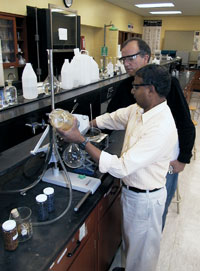
LAB FARMING - The lab at the Carbonear campus will be a useful tool for students of the Agribusiness program, coordinated by Chris Turpin. Chemist Dr. Somasundaram Karunanithy works at the lab where "chemicals extracted from locally grown blueberries are further processed to produce useful fractions, which are further analysed for commercial applications."
~ Photo by Lillian Simmons/The Compass